In seventy years, no forensic study proving the existence and operation of the “Nazi gas chambers”!
In tribute to Professor Ben Zion Dinur (1884-1973), founder of Yad Vashem in 1953, forced to resign in 1959 for having preferred scientific History to Jewish Memory (as explained in my article in French of June 15, 2006)
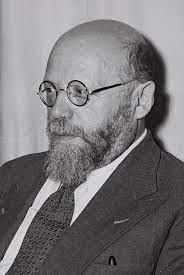
For the most commonplace homicide the judicial authority, happily enough, is never satisfied with “testimonies” but demands, before anything else, a forensic examination; to this purpose, the technical service of the police examines both the crime scene and the murder weapon while, for their part, the forensic police put to laboratory analysis all physical elements liable to enlighten the investigators. It is afterwards, in light of the forensic examination and an analysis of the facts as materially established, that one may knowledgeably seek to gauge the value of certain witnesses’ accounts. Personally, for over half a century I have wanted to know what the formidable “murder weapon” that was the Nazi gas chamber looked like; I expected to see a technical illustration of that weapon and an explanation of its use. I noted that in some former German concentration camps, since turned into theme parks, visitors were shown a room said to be a “Nazi gas chamber” but, curiously, not the least scientific evidence could be supplied to support that assertion, no results of any forensic examination. In the early 1960s, on my first visit to the Centre de documentation juive contemporaine (CDJC) in Paris, my only question to those in charge had been: “Can you show me a photo of a Nazi gas chamber?” They were unable to do so. Ditto at the Holocaust Memorial Museum in Washington in 1994, and in a good number of other places. The general public may be fooled with photos like that of the American politicians “visiting the Dachau gas chamber” but no longer will anyone venture to employ the same procedure when dealing with a researcher who knows his subject.
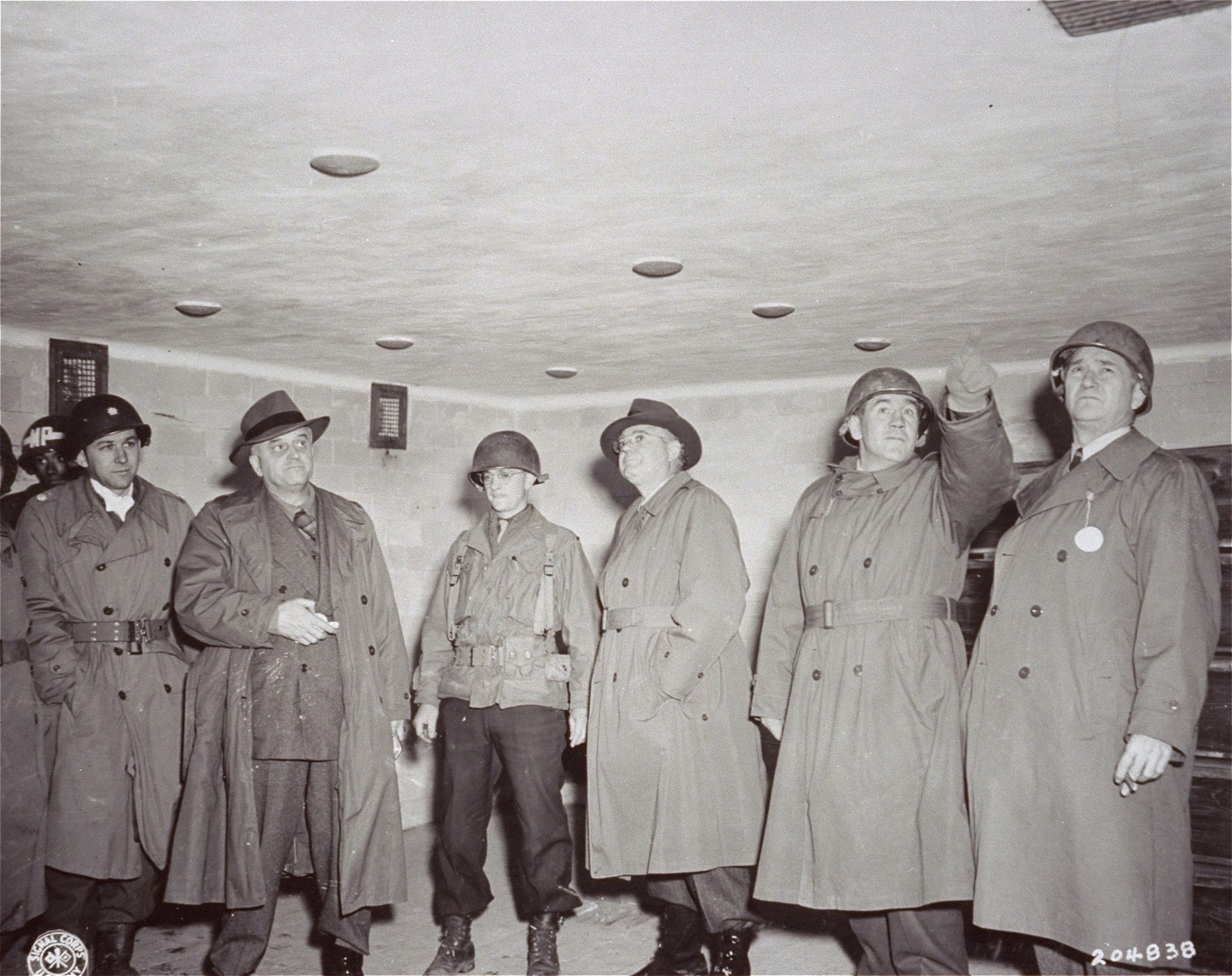
After several years of research consisting in visits, readings, meetings with experts – for example, those of the central laboratory of the Paris police, rue de Dantzig in the 15th arrondissement or, in the United States – right from the beginning of my investigation into the execution gas chambers of certain penitentiaries – I had accumulated a considerable amount of information 1) on German gas chambers for disinfestation using Zyklon B, a product whose main component was hydrocyanic acid, 2) on American gas chambers for the execution of a single prisoner, also by means of hydrocyanic acid. However, at the same period, I was obliged to admit that I still did not know how, technically, those supposed Nazi gas chambers, used day and night to exterminate, at Auschwitz for instance, hundreds or thousands of people at a time, could have been made and could have worked. I did not succeed in finding anyone, in France or abroad, to explain to me how the gassers and their helpers could have handled the corpses without mortally contaminating themselves (hydrocyanic acid penetrates the skin and stays there, whereas with airing out, forced ventilation and still other means, it can be removed from clothes, shorn hair, metallic objects or other things). According to a text that was presented as a confession of Rudolf Höss, one of the three successive commandants of Auschwitz, I remained puzzled and no one could explain the mysteries to me. For example, how had the members of a Sonderkommando or “special squad”, once the victims’ screaming stopped and a ventilation device was turned on, been able to enter “sofort” (immediately) what would have been a sea of hydrogen cyanide, and that while eating and smoking, in other words, without even wearing a gas mask? Zyklon B consisted of hydrocyanic acid on an inert porous base. Invented in 1922 and patented in late 1926, it had the disadvantage of being explosive, ignitable by the slightest spark, even from static electricity. To use it as we are told it was used for the Auschwitz-I “gas chamber”, in proximity to a crematory oven heating up, would have been sheer madness. It was I who, ultimately, discovered the building plans of the crematorium at Auschwitz-I and those of crematoria II,III, IV and V at Birkenau. They had been kept hidden since the end of the war. I found them on March 19, 1976 in the archives of the Auschwitz State Museum. Thus I can state, in knowledge of the facts, that it would have been impossible to make 2,000 persons – as asserted by R. Höss in the account he gave at Nuremberg on April 15, 1946 – enter a space of 210 square metres (where, incidentally, assuming it were possible after all, there would hardly have been any need of gas to kill them, for they would simply have died of asphyxiation due to a rapid depletion of oxygen). Never could the men of the Sonderkommando have set about, with all their might, the cyclopean task of disentangling, in an atmosphere full of hydrocyanic acid, so many bodies from one another and dragging each to a small lift connecting to the upper floor and the oven room. I had learnt that, for a team of exterminators carrying out the simple disinfestation of a house with Zyklon B, any physical effort was strictly prohibited, since it would have accelerated the men’s breathing and so prevented the gas mask filters from serving their purpose. The rules [see Nuremberg document NI-9912 – ed.] specified that at the end of a building’s disinfestation, when it was time to open the windows to air out the premises, one must not persist in trying to open a window that offered resistance but instead go and open the others. (To those who claim, without any evidence, that the Germans destroyed all their gas chambers, I retort: “In that case, draw me the things which, according to you, the Germans destroyed”.)
The stunning conclusion of this research: in nearly seventy years, neither the International Military Tribunal (IMT) at Nuremberg (1945-1946) nor any of the numerous other courts which have had to try cases of alleged crimes committed using gas chambers (or gas vans) has ordered a single forensic examination. Better still: at the “Auschwitz Trial” in Frankfurt, running from December 20, 1963 to August 20, 1965, an inspection of certain points of the Auschwitz-Birkenau camp was held from December 14 to 16, 1964; one of the judges, Hotz, participated along with four prosecutors; however, it appears that the five men dispensed with any detailed inspection of the places where so many criminal gassings, followed by so many cremations, were said to have occurred. How can it be? A huge show trial had focused, twenty years after the war, on Auschwitz, capital of the greatest crime in world history, and the judges-accusers made not the faintest effort to inquire as to how such mass murder was first conceived, then perpetrated – and all over a period of years? Never has anyone been able to provide me with a copy of forensic examinations of the “crime of Auschwitz”. I have been smothered with testimonies, stories, confessions, history books of which I have imposed on myself the most scrupulous reading but, all told, only to discover vague accounts defying the laws of physics or chemistry. One forensic examination, and one only, would have sufficed.
The crematoria of Auschwitz or Birkenau had at most, as I discovered in certain documents hidden since 1945, rooms called Leichenhalle or Leichenkeller (depositories, at ground level or semi-interred, for bodies) perfectly typical in their size and, above all, in their ventilation system. In 1982 I also discovered that there had been a forensic examination of the alleged gas chamber of the Struthof camp in Alsace, which I had visited in 1974 and which had looked to me a crude fake; I was later to learn that it was, in part, the product of work carried out after the war by a firm in the town of Saint-Michel-sur-Meurthe. Entrusted to Professor René Fabre, dean of the college of pharmacy in Paris, the examination concluded, as of December 1, 1945, on the absence of any trace whatsoever of hydrocyanic acid either 1) in the exhaust chimney of the alleged gas chamber and the scrapings taken from them (X jars and Y jars) or 2) in the corpses of the alleged Struthof gassing victims found in Strasbourg civil hospital. René Fabre’s report has disappeared from the French military justice archives but we know its findings thanks to a paper in the file signed by three physicians who took part in the study: Drs Simonin, Piedelièvre and Fourcade (Whether “Holocaust by gas” or “Holocaust by bullets”: no physical or forensic evidence!). The three were chagrined at the result reached by Fabre but they had still been honest and scrupulous enough to report it.
Meanwhile, I had had to wait until 1978-1979 for the daily Le Monde to publish two texts in which I demonstrated that the alleged Nazi gas chambers were technically impossible. On February 21, 1979 the same newspaper printed a “declaration” signed by 34 historians retorting to me: “One must not ask oneself how, technically, such a mass murder was possible; it was technically possible, since it happened”. This fine bit of academic asininity was but an escape hatch allowing its authors to shirk their duty and refuse any response to my arguments, which were mainly of a physical, chemical and architectural order, but also documentary and historiographical. However, since that date a multitude of authors – historians, journalists – have certainly tried to defend the thesis of the supposed Nazi gas chambers’ existence and operation but none has been able to answer my request, repeated a hundred times: “Show me or draw me a Nazi gas chamber!” Still recently, a thick book of quite scholarly appearance has been devoted to the alleged Nazi mass murders by poison gas, but in it there is not to be found a single representation of a gas chamber, not one technical illustration, not the shadow of a concrete reply to my challenge. It is the second edition, revised and corrected – released in 2012 –, of a book first published in 2011: Neue Studien zu nationalsozialistischen Massentötungen durch Giftgas / Historische Bedeutung, Technische Entwicklung, revisionistische Leugnung, Metropol Verlag, Berlin, XXXIV-446 pages, particularly dense. The principal authors are Günter Morsch and Bertrand Perz, with the collaboration of Astrid Ley. To these three names should be added about thirty others including, for example, Brigitte Bailer, Jean-Yves Camus, Barbara Distel, Richard J. Evans and Robert Jan van Pelt. The title means: “New studies on the National Socialist mass murders by poison gas / Historical significance, technical evolution and revisionist denial”. But how can one devise the study of a lethal weapon’s technical evolution without providing a single technical illustration of that weapon? How can one respond to “revisionist denial” without taking up its main challenge, which amounts to saying that the essential weapon of the alleged crime is obviously, quite simply, impossible to design and depict when one is aware, for example, of the unavoidable complication of an American gas chamber for the execution of a lone person? For, in an execution gassing, the difficulty lies not so much in killing another without killing oneself as in going, after the execution, to take a cyanide-infused body out of its seat and out of the chamber, without causing risk to anyone: a difficulty which, as has been noted, the Germans and the Sonderkommando members, for their part, apparently surmounted thousands of times every day. Let us repeat: to kill a crowd of people in a room with hydrocyanic acid is dangerous but not impossible; to enter the room afterwards, even with a gas mask, amid a host of cyanide-infused corpses and then proceed to extricate and carry them, in the course of a few hours, so as to make way for a new gassing of the same proportion, is in the domain of the impossible. The reader will have understood: serial mass gassings are just another silly story (as Yehuda Bauer has admitted in regard to what is abundantly said about “Wannsee”) of the same kind as those about “Jewish soap”, “lampshades of human skin”, extermination of the Jewish detainees at Treblinka by steam (official Nuremberg document PS-3311), their extermination at Auschwitz by electricity and in blast furnaces (the Soviet press in early February 1945), or, near Belzec, by quicklime (Jan Karski). There is an endless list of nonsensical tales in the manner of Élie Wiesel or Father Patrick Desbois, about “geysers of blood”, or a hand emerging from a mass grave to grab a shovel, or systematic extermination under quilts or pillows (“the Holocaust by suffocation”!). My own writings are not ignored in this hefty book, since my name appears 33 times (and not only 12, as the index may lead one to believe). “Mr Faurisson, you haunt my nights!” exclaimed in 1981, in a Paris courtroom, Bernard Jouanneau, lawyer and friend of Robert Badinter. Another time, in 1982, the same Jouanneau was to burst into sobs upon suddenly realising that the evidence of the existence of Nazi gas chambers he had just offered to the first chamber of the Paris court of appeal (presiding judge: François Grégoire) “was not worth very much” (his own words, in a moment of touching sincerity). I think I have also revealed to Raul Hilberg (an American Jew) and to Robert Jan van Pelt (a Canadian Jew, his successor as historian of “the Holocaust”) how they have failed, each at his end, in their offers of proof. It is especially R. J. van Pelt who in the book in question takes charge of giving me a reply. His lines of penance (p. 343-354), which are pathetic, are essentially based on the writings of Jean-Claude Pressac, but van Pelt avoids disclosing that their author disowned them on June 15, 1995 (a month after his appearance in the XVIIth chamber of the Paris correctional court, where barrister Éric Delcroix, aided by my information, had subjected him to outright humiliation). Pressac went so far as to admit that the present version, “though triumphant”, of the official history of the extermination of the Jews was “rotten” with too many lies and doomed to “the rubbish bin of history” (quoted in my analysis of May 5, 2000 entitled Valérie Igounet: Histoire du négationnisme en France). But has not van Pelt himself admitted – in December 2009 – that the Auschwitz-Birkenau camp, where millions of pilgrims have gone on organised visits, contains, so to speak, no “physical evidence” of what we “know” (sic) about “the Holocaust” (A case for letting nature take back Auschwitz, Toronto Star, December 27, 2009)? Among historians, the myth of the Nazi gas chambers is on its last legs. Instead of trying to keep it alive artificially with the persistent clamour, spectacles, advertising, repression, threats, blackmail, it would be better simply to bury it, as the State of Israel finally decided to do with the body-corpse of Ariel Sharon.
In conclusion, if there is a fact on which we revisionists ought to call the attention of the layman, is it not this tacit agreement of all French or foreign judicial systems never to demand, for 70 years, any criminological inspection of the murder weapon, that is, an unprecedented weapon that enabled the killing, in industrial proportions, of millions of victims? With one exception, that of Struthof, for which, as if by intent, a forensic examination produced a completely negative finding: no gas chambers, no gassed.
At bottom, all judicial systems have followed the example of the instance called International Military Tribunal which, in 1945-1946, assumed the right, as a court of “justice” set up by the winners of the recent war, to try its own vanquished. Its organiser, the American prosecutor Jackson, had declared with a fine cynicism: “As a military tribunal, this Court is a continuation of the war effort of the Allied nations”, IMT, vol. XIX, p 398 – 26 July 1946). Articles 19 and 21 of its Charter read: “The Tribunal shall not be bound by technical rules of evidence […]. The Tribunal shall not require proof of facts of common knowledge but shall take judicial notice thereof”. Thus did allegations advanced without any proof by Allied propaganda receive the formal endorsement of a strictly Allied – and not “international” – tribunal. Better still, in accordance with the next and closing sentence of Article 21, a whole series of reports drafted by the winners on crimes imputed by themselves to the defeated were to be automatically received as authentic evidence, and no one would be allowed to challenge them! Such were the effects of that Tribunal’s “judicial notice”. And forty-five years afterwards there was to be something even more abhorrent in the domain of law: in France, “homeland of human rights”, Laurent Fabius and his people got a Socialist-Communist majority in Parliament to pass (and to have published in the Journal Officiel de la République Française on July 14, 1990, for the 201st anniversary of the storming of the Bastille, bastion of the privilege-based regime of another time) a law forbidding, on pain of fine and imprisonment, any dispute (in whatsoever manner – including ironic expressions, as case law was to specify) of the reality of those crimes committed especially against Jews, a reality, however, never described or established by any technical or forensic police service. (On this point one will be wary of old Polish examinations attesting the existence of traces of hydrogen cyanide in hair or in metal objects – all disinfected –, or of an examination undertaken at quite a late date – around 1990 – in an attempt to reply to the “Leuchter Report” of 1988; that study, done by the Jan Sehn Institute in Cracow, proved embarrassing for the Poles and valuable for the revisionists). And I shall not expand here on the saga, in Vienna, of the forensic examination by Gerhard Jagschitz, or that by Walter Lüftl; the reader may look up those two names in my Écrits révisionnistes in order to have an idea of the behaviour of certain Austrian judges who, seized with daring, ordered an examination and then, taking fright, capitulated. The name of a certain captain Fribourg, of the French army, and his “beginning of a study” of the alleged Dachau gas chamber may also be found.
The lie of the Nazi gas chambers will go down one day in history as one of the most fabulous impostures of all time. This lie has developed slowly, without plot or conspiracy, and without the general public’s becoming aware of it. If the good people have been so badly taken in, it has in a way been with their consent and cooperation. They have believed, then wanted to believe, then in the end wanted to have others believe and are now legally bound to believe. All this has happened in the same way as when a government wants to launch a peaceful population into a military campaign. Such a government has no need of either plot or conspiracy. Making a show of its sentiments of goodness, it will appeal, thanks to the servility of a “free press”, to notions of rights, of justice and of virtue precisely because it is about to violate cynically rights, justice and virtue. The people will start believing the government, then go along with it and, finally, run with it. Year in, year out, they will find themselves at war, armed from head to foot. And they will readily fight “the evil beast”, against which anything goes, starting with the right to lie and hate, then to plunder, rape, kill by hanging and, supreme reward, the right of their establishment to write the history of it all as it sees fit. Spontaneously they will get into the habit of hating, lying, marching in step. And those who try to make them see reason will no longer be anything but “expert liars, gangsters of history”, diabolical “Nazis” quite simply. The lesson has been learnt well. But now it is going to have to be unlearnt, reviewed, corrected. We are at the dawn of the year 2015. Let’s draw up the death certificate of the historical lie of the magical Nazi gas chambers. In a return to respect for accuracy in history, let’s promise ourselves that this gigantic imposture will be “the very last”. Until the next one, of course. For – let’s take care not to forget it – Céline, who, as early as 1950, denounced “the magical gas chamber” and stated: “It was everything, the gas chamber. It allowed EVERYTHING!”, added nevertheless: “They’ll have to find something else, oh! my mind’s at rest”. In 1932, in Journey to the End of the Night, he warned: “The frenzy of lying and believing is catching like the itch”. Frailty of man! Where can he have got this facility, then this ardour to believe in a diabolical weapon that he is not even allowed to see? To aim straight, one must aim low. So then, let’s aim low! Let’s not have recourse to mass psychology, psychoanalysis, sociology or any other science! I wonder whether a simple point of vocabulary (in French with the curious expression “chambre à gaz”, in English with “gas chamber”, in German with “Gaskammer” and in other languages as well) would explain the ease and appetite with which such a story has been swallowed. It so happens that the French term “chambre à gaz” is based on that of “chambre à coucher” (bedroom). To name the instrument that administers death, a combination of words that implicitly evoke rest and sleep has been chosen. Why, then, rack one’s brains wondering what that instrument looked like and how it worked? A gas chamber, in the minds of the simple, is simple: it must be like a bedroom or any room, but with gas inside. A man is put in it; some time later, the individual is found dead and it only remains to take away the body; as for the gas, it has dissipated. There is no need to undertake a scientific investigation: proof of a gassing is not to be sought in a forensic examination, for testimonies will suffice. After all, hadn’t the Germans already distinguished themselves during the First World War by their use of poison gas? One of the most brazen lies in history, the alleged Nazi gas chambers, of course originated in hatred and in the inveterate habit of lying but it has thrived on naivety. In perfectly good faith, the good people were outraged at that “Nazi horror”. In doing so, they lent a hand to a gigantic slander, a criminal lie of worldwide proportions. Sancta simplicitas! Blessed ingenuousness! Historians are beginning to show dissent against this mix of lies and candour, whilst the third post-war generation manifests annoyance at the continuing indoctrination. And the Internet is there. The conditions for a reawakening of minds seem to exist. The Jews, as a whole, and the Israelis would have been well advised to listen to the founder of Yad Vashem, Prof. Ben Zion Dinur, born Dinaburg. Some Jews, such as Josef Ginzburg (aka Joseph G. Burg), Gilad Atzmon and Paul Eisen have done so. They deserve our esteem. But, at this moment, our thoughts must go first to the sizeable cohort of revisionists humiliated, insulted, scorned, beaten, driven to ruin, suicide, sentenced to imprisonment and sometimes even forced into dishonour. And to begin with, our thoughts must go to the very first of them: the Frenchmen Maurice Bardèche, author of Nuremberg or the Promised Land (1948), and Paul Rassinier, author of Le Mensonge d’Ulysse (1950, published in English under the title The Holocaust Story and the Lies of Ulysses).
Practical conclusion: from now on, each time an opponent of revisionism takes the liberty of invoking another testimony in support of the existence of the alleged Nazi gas chambers, let’s ask him to show us instead a forensic study of the murder weapon, the weapon of the crime of all crimes. Each time, on site at Auschwitz-I, Majdanek, Mauthausen, Struthof or elsewhere, that a guide has the nerve to state: “This place is (or: was) a gas chamber in which the Nazis killed Jews”, let’s demand, instead of testimonies, proof, one proof only (forensic proof supplied by the appropriate police services), in support of that accusation. To end, in the face of the judges who try us, let’s launch the question: “What right has anyone to threaten with the scourge of the law a person who refuses to believe in the existence of a prodigious weapon which, in seventy years, no one has ever been able to describe or show, not even with an explanatory drawing?” There can be no right to convict a man who asked the French University how exactly such slaughterhouses were designed and how they functioned, and to whom thirty-four members of that university pitifully replied with the asinine words quoted above: “One must not ask oneself how, technically, such a mass murder was possible; it was technically possible, since it happened”.
ONE PROOF, FINALLY, OR… LET THE IMPOSTERS KEEP QUIET!
December 31, 2014
***
Complement no. 1: To end, “the killer question!”
If the innocuous body depositories of the crematoria were indeed turned respectively into undressing rooms in one place and gas chambers in another, where was it possible, day by day, to store the bodies of those who had died of natural causes? Let someone show me that area, either on the spot or in the building plans that were kept hidden until I myself discovered them! Where were the bodies put when, particularly, typhus epidemics were wreaking havoc among the detainees, the Polish and German civilians, the German soldiers and doctors in the hospital facilities reserved either for inmates or for soldiers (such as, for example, the SS Revier, situated a few paces away from the Auschwitz-I crematorium)? Let’s recall that those depositories could be of three kinds: 1) for bodies not yet placed in coffins; 2) for bodies in coffins; 3) for infected bodies (with reinforced isolation of the room), which was the case in the Sachsenhausen-Oranienburg camp. Will someone have us believe that, equipped as they were with an undressing room and a gas chamber, those “Nazi” crematoria simply lacked any body depositories? Crematoria without depositories? Only in the realm of fiction!
Complement no. 2: The alleged homicidal gas chamber of Auschwitz-I (“Everything in it is false”, as Éric Conan ended up admitting)
Below, the first photo is that of the door of a genuine gas chamber for the execution of one person alone by hydrocyanic acid (HCN). This is an American gas chamber built according to the technique developed in the 1930s and ’40s. I examined it in September 1979 at Baltimore penitentiary. For more photos and all pertinent explanations, see Gas chamber of the Maryland State Penitentiary, Baltimore (USA).
The next two photos show one of the doors of an alleged gas chamber for the killing of a crowd of people with the same gas. This is the “gas chamber” of Auschwitz-I (main camp), thus far visited by millions of tourists. The door opens inwards, which constitutes an absurdity since the corpses strewn about on the floor inside would have prevented it from opening. The same door, closed, reveals two more absurdities, since gas would have escaped through both the keyhole and the easily breakable glass pane, thus reaching the nearby SS infirmary. In 1995 the orthodox historian Éric Conan wrote that I was right about the impressive set of “falsifications” I had discovered in 1975-1976. Numerous others have, in the past, denounced these falsifications. Why are they still passed over in silence today?
These three photos thus invite the comparison of a door of a real execution gas chamber (located in Baltimore) on the one hand, with a door, shown first open and then closed, of an alleged execution gas chamber (located at Auschwitz-I) on the other.
A real execution gas chamber door is of steel, like all the rest of the construction, and its pane is of Herculite glass. To avoid letting the hydrocyanic acid erode the door joints and so, eventually, escape and spread outside, a vacuum must be created in the chamber. But creating a vacuum can cause a general collapse. Hence the extreme and indispensable robustness of the whole. The American humanitarians who advocated execution by gas (instead of execution by shooting, hanging or electricity, considered too cruel) imagined that nothing would be simpler than the use of gas. They were to be disenchanted. It took American engineers seven years (1917-1924) to develop their first homicidal gas chamber. And the first execution, in 1924 in Carson City (Nevada), nearly resulted in disaster from the significant presence of lethal gas in the prison corridors after the death of the condemned man[1].
Finally, a series of twelve photos showing real execution gas chambers (in the United States) with their doors and, at the bottom, four photos showing the doors of a false gas chamber (at Auschwitz).
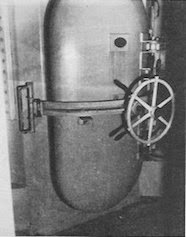
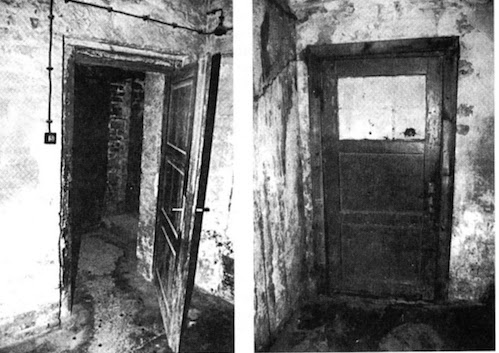
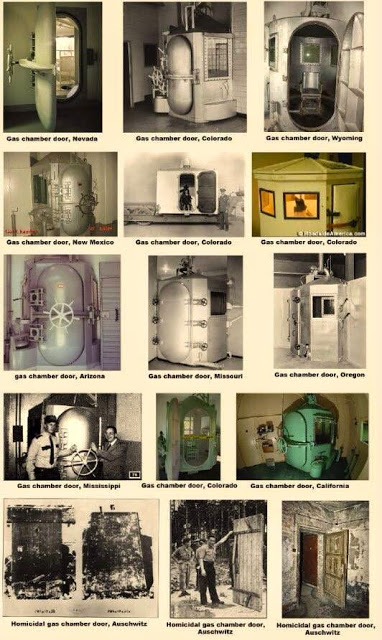
__________________
[1] See Scott Christianson, The Last Gasp. The Rise and Fall of the American Gas Chamber, University of California Press, Berkeley 2010, XIV-325 p., passim.
